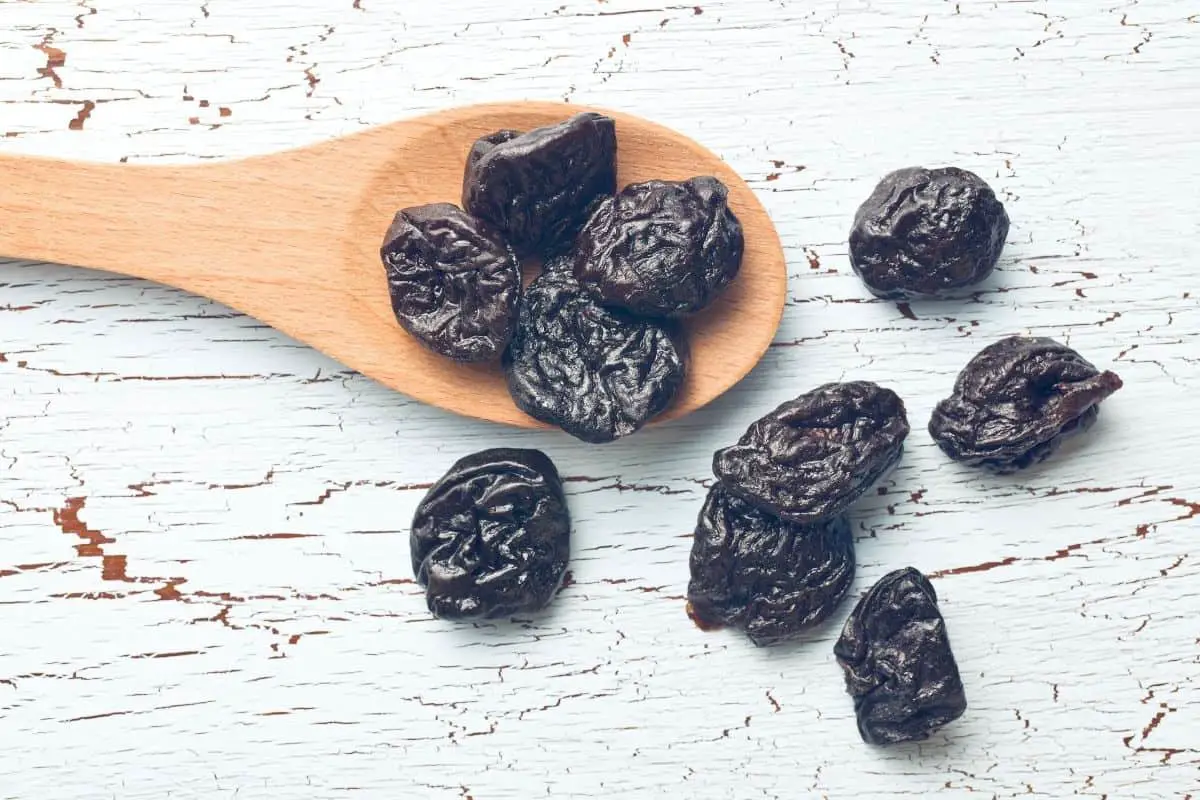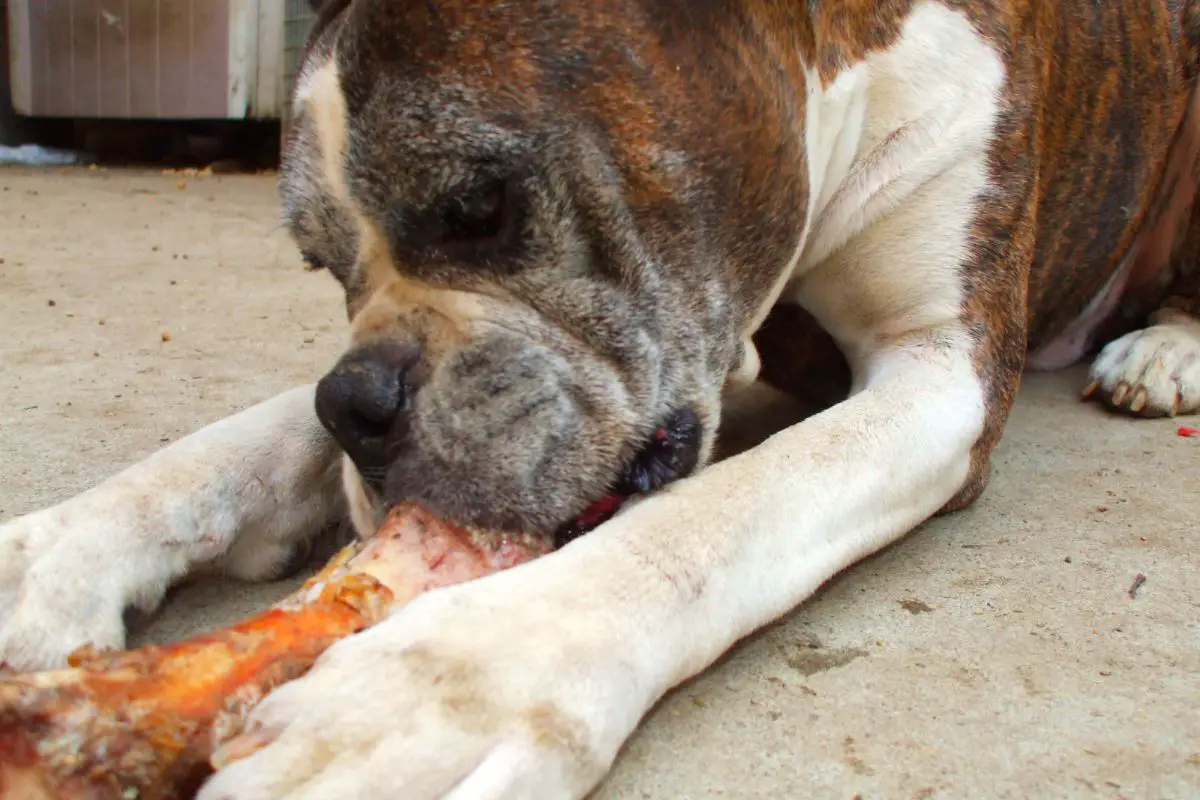This post contains affiliate links.
Prunes are a delicious and healthy snack for people, with many using them to relieve constipation. But do they have the same effect on dogs, and are they safe for your pup to consume?
Dogs can eat prunes as they are non-toxic, but you still shouldn’t offer them as treats. Prunes come from plums, which contain a lot of fiber and sugar. A dog’s digestive system can’t handle those ingredients as well as ours can, and too much can lead to diarrhea and other stomach problems.
If your pet steals a prune or two, you don’t have to worry about them falling ill. However, too many prunes can lead to stomach and digestive problems, especially in smaller dogs. This article will explore why you should avoid feeding your dog prunes and offer some vet-approved alternatives.
Table of Contents
Are Prunes Toxic to Dogs?
Prunes are not toxic to dogs, according to vet research. However, vets also mentioned that though plums aren’t toxic to your pet, the leaves, pit, and stem on the fruit contain small amounts of cyanide – which are dangerous when consumed in large amounts.
The side effects your dog gets from eating a few prunes shouldn’t be severe, and chances are, your pet won’t experience symptoms after a few days if they only consume one or two prunes.
Still, if you are worried about your pup, you should always call your local vet.
That said, your pet may be at risk after eating the pit, or large seed, in a prune. The pit can cause several health problems for your dog, which requires a vet to provide care. Let’s go into this in a little more detail below.
Dangers of Prune Pits
The pit in a prune is the most dangerous part of the dried fruit, at least to your pup. The large seed is hard with many sharp angles, it contains cyanide, and your dog won’t be able to digest it.
Unfortunately, if your dog ate several prune pits, they are in danger. The hard, sharp angles can scratch your dog’s stomach and gut, causing internal bleeding, or it can even cause serious blockages inside your dog’s digestive tract.
If you think your pup ate any prune pits, you will need to visit your vet right away. Leaving the issue untreated can even be fatal for your dog.
Signs of Prune or Plum Poisoning
While one pitted prune isn’t likely to poison your dog, several of them can. If your dog ate more than one prune, you will need to watch them for the following symptoms:
- Struggling to breathe
- Dilated pupils
- Tremors or seizures
- Panting
- Collapse or fainting
- Confusion
- Mouth foaming
If you notice any of these signs, go to your vet right away – your dog may be experiencing cyanide poisoning from the prunes they ate.
While the condition is not likely unless your dog consumes many prunes, you should always keep an eye on them after eating something they shouldn’t.
Call the Animal Poison Control Hotline at (888) 426-4435 if your vet is not open. The hotline is open 24/7- even on holidays and the representative who takes your call will let you know what steps you can take to help your pet. Their website is also full of useful information to prevent poisoning in dogs.
It is worth noting that smaller dogs will be impacted by poisoning much faster than larger dogs. A small dog doesn’t need to eat as many prunes to get sick, with the symptoms appearing much faster.
Why Aren’t Prunes Good for Dogs?
Prunes aren’t good for dogs because of the amount of fiber they contain. Fiber is healthy for dogs to eat, but prunes contain way too much for them to digest properly. They are also high in sugar, which dogs cannot digest in the same way we can, leading to stomach problems.
Your dog’s body won’t process a prune the same way ours does. That means your dog likely won’t experience relief from constipation by eating one. Instead, they will likely experience an upset stomach, vomiting, or diarrhea after eating prunes.
Plums are Bad for Dogs
Prunes are just dried plums- which are very bad for dogs to eat. The fruit is more likely to cause poisoning in your pet when it isn’t dried since it still contains the pit.
The plum also will have the stem and leaves still attached, which contain cyanide.
Plum poisoning can be fatal if your dog consumes large amounts of the fruit. Therefore, you should bring your dog to the vet immediately if they have tremors, are panting heavily, or are vomiting.
Your vet can provide solutions to counteract the poisoning, which you can’t do at home.
Can Dogs Have Prune Juice?
Dogs cannot have prune juice because it contains many of the same ingredients as the pitted prune but also is likely to contain even more added sugars.
If you offer your pet prune juice, they will likely get sick due to the concentrated nature of the juice.
Can Dogs Have Prunes for Constipation?
Dogs cannot have prunes for constipation relief. Since prunes are a natural laxative for people, many mistakenly believe that they also work well for their pets. But the high amounts of fiber and sugar can cause diarrhea and vomiting, which can lead to severe dehydration.
Too many prunes will have a negative impact on your pet’s digestive health. It is better to offer them alternative methods over prunes if they are having trouble going to the bathroom.
Alternative Constipation Methods for Your Dog
The following methods work well to help your dog’s digestive system:
- Adding more canned dog food to their diet
- Giving them more water
- Taking them on more walks
- Canned pumpkin occasionally
- Enema or laxative medicine
Pumpkin is the best alternative to prunes, and most dogs only need to eat a spoonful to receive the benefits. Plus, pumpkin is not toxic to your pet and is actually very healthy for them to eat. Your pet will also enjoy the taste- making it the best alternative to feeding your pup a prune.
Before trying anything, talk with your vet if constipation keeps occurring, as this could be a sign of another condition.
What Causes Dog Constipation?
Here are some of the most common causes of dog constipation:
- Not enough fiber in their diet
- Lack of exercise
- Blockages in their digestive system
- Age
- Dehydration
- Prostate or anal gland issues
- Medicines
- Injury
If you are not sure what could be the cause of this condition in your dog, I recommend that you contact your vet. There are several causes, some more serious than others, and your vet can diagnose and treat the condition properly.
In most cases, your dog is dehydrated and is not getting enough fiber. So, make sure to offer them plenty of water during the day, especially if it is warm outside.
Dog Supplements You Can Try for Constipation
If you were thinking of using prunes as a gut health treatment for your pet, I recommend against it.
Instead, you should try the Perfect Poop Digestion & Health Supplement for Dogs from Amazon.com. The supplement includes plenty of fiber and vitamins, which help them use the bathroom.
Alternatively, you could also try using the Zesty Paws 8-in-1 Bites (found on Amazon.com). The supplements contain vitamins, fiber, and antioxidants. Overall, these ingredients work well to help your dog have better health.
No matter what supplement brand you decide to use, your dog’s gut health will benefit.
Final Thoughts
To summarize, you don’t want to give your dog prunes. They will be alright if they steal one or two, but you never want to purposefully give them to your pet as a treat. Prunes don’t come with many health benefits for dogs and can even make them sick, so it’s best to air on the side of caution and avoid them altogether.
If you are looking for constipation relief for your pup, I recommend that you try feeding them small amounts of pumpkin, increase their daily exercise, and offer them more water during the day.
Related Articles
- Can Dogs Eat Sauerkraut? (We Find Out)
- Can Dogs Eat Turnips? Here’s What the Expert Says
- Can Dogs Eat Watermelon? And What About the Seeds?
- Can Dogs Eat Black Eyed Peas (Is It Safe?)
- Can Dogs Eat Edamame? (We Find Out!)
Sources
- Popular Doodle: Can Dogs Eat Prunes? Read Before You Feed!
- Rover: Can My Dog Eat Prunes?
- Wag: Plum Poisoning in Dogs
- Love Your Dog: Can Dogs Eat Prunes? Are Prunes Safe For Dogs to Eat?
- Dog Constipation: How to Help Your Pet & When to See a Vet
- Animal Poison Control Hotline
Mrdogfood.com is a participant in the Amazon Services LLC Associates Program, an affiliate advertising program designed to provide a means for sites to earn advertising fees by advertising and linking to Amazon.com. We also participate in other affiliate programs which compensate us for referring traffic.




